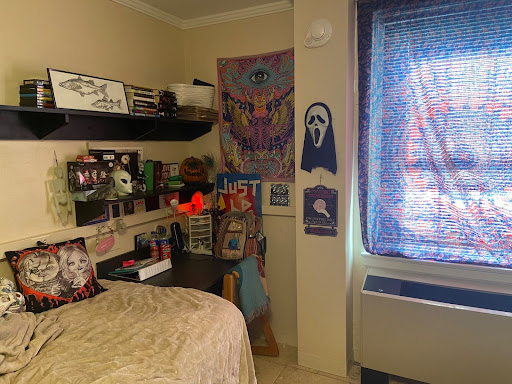Community Service Institute training prepares community for service
This year’s makeup Community Service Institute training session aimed to demonstrate the dedication of Guilford College to promoting volunteering and serving the community. Whether through presenting information and advice or helping attendees’ communication skills, the training event served to prepare members of the Guilford community to be able to serve those in need.
“I think (Guilford) does a really good job,” said Eva Hart, an attendee of the training, “I’ve learned about so many different opportunities and ways that I can give back to the community.”
After a brief introduction where the 33 attendees shared their names and volunteer sites, the session began with a Kahoot on the subject of immigration. The questions included current topics, such as the difference between an asylum seeker and an asylee, and the myth that immigrants are here to steal jobs from natural-born citizens. Although the game was successful in creating a more casual atmosphere at the training, it also worked to instruct attendees and correct common misconceptions.
Once the Kahoot was over, the presenters transitioned to the topic of food justice. They explained what a food desert is, as well as how most of the city of Greensboro, containing 17 food deserts, is especially food insecure. They also explained that the lack of proximate grocery stores, the lack of efficient transportation and the bag limit on city buses prevents many Greensboro residents from purchasing the food that they may otherwise have access to, and forces them to rely on fast food. This fast food, while cheap and readily-available, can not sustain a healthy lifestyle.
The coordinators then transitioned to education, their third topic point. One of the tasks of the volunteers is working with refugee children at volunteer sites such as Glen Haven and Oakwood Forest. As part of the training, the coordinators had the job of teaching the attendees how to be effective mentors to refugee children.
They did this by forming small groups and allowing each group to complete a Venn diagram between mentoring and etiquette. They then read out scenarios that could happen between kids and volunteers and explained how to handle them. Finally, they handed out a sheet of paper that contained the do’s and don’ts of mentoring, promoting being a role model and dissuading forcing any ideas or solutions on anyone.
For the last part of the session, the coordinators brought in assistants to help with the language facilitation activity. The purpose of the activity was to simulate and prepare for when there would be a language barrier between children and volunteers. The assistants would only speak in a different language and pretend not to comprehend any English, forcing attendees to communicate through gestures and pictures.
The training session’s coordinators reinforced the importance of coming to a volunteer site prepared and equipped with the relevant knowledge, such as immigration.
“We deal with a lot of different communities within Greensboro,” said senior Jeniffer Gonzalez Reyes, one of the three main coordinators. “So we try to cover very broad conversations into one training. There have been instances where you’re trying to say something to a parent, and the coordinator is not around, so you have to figure out how to do it.”
After attending the session, the attendees are now ready to serve at their service sites and make a difference in both the Guilford community and the community of the city of Greensboro.








